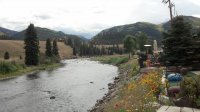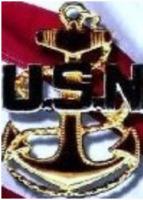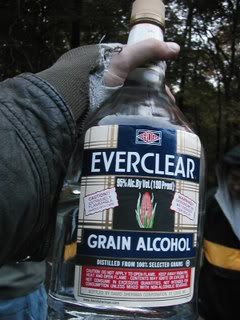- Posts: 795
- Thank you received: 0
Last of "Doolittle Raiders" pilots, dies in Boulder Read mo
- Mayhem
-
 Topic Author
Topic Author
- Mountain Legend
-

Col. William Marsh "Bill" Bower, the last surviving pilot of "Doolittle's Raiders" who bombed Japan in 1942, died Monday at his home in south Boulder.
He was 93 and "lived a completely full life," said his son Jim Bower.
Bill Bower was hailed as a hero for his role in the United States' first air attack on Japan following the bombing of Pearl Harbor on Dec. 7, 1941. He volunteered and was chosen for the mission, which was planned and led by Lt. Col. James "Jimmy" Doolittle.
On April 18, 1942, 16 B25B Mitchell medium bombers took off from the decks of the U.S.S. Hornet in the western Pacific Ocean. Because landing planes of that size on the Hornet was impossible, the pilots continued toward China after bombing their targets in Japan.
All but one of the aircraft, which landed in the Soviet Union, crashed in China or were ditched at sea. Of the 80 crew members, 11 were either captured or killed; the rest returned to the United States.
http://www.denverpost.com/news/ci_17064884?source=rss
Read more: Bill Bower, last of "Doolittle Raiders" pilots, dies in Boulder - The Denver Post http://www.denverpost.com/news/ci_17064 ... z1B54R0CcA
Read The Denver Post's Terms of Use of its content: http://www.denverpost.com/termsofuse
Please Log in or Create an account to join the conversation.
- Mayhem
-
 Topic Author
Topic Author
- Mountain Legend
-

- Posts: 795
- Thank you received: 0
Please Log in or Create an account to join the conversation.
- Mayhem
-
 Topic Author
Topic Author
- Mountain Legend
-

- Posts: 795
- Thank you received: 0
US defence cuts are not about saving money – they are about changing America’s strategic role
President Barack Obama has made it very clear that he is not in the least interested in getting American government spending under control. A month ago he urged Congress to pass a $1.2 trillion spending bill larded with tens of billions of dollars for projects for Democratic Party core constituencies. Luckily, Senate Republicans found enough backbone to stop Obama’s latest binge spending programme as Mr Obama criticized the Republicans for their rare exercise of spending discipline.
Now we have a new budget proposal by the President. He wants $78 billion in cuts in US military spending, with large cuts to current troop strength – 27,000 men for the Army and as many as 20,000 for the US Marine Corps. These cuts, along with the cuts Mr Obama has already made to the US Navy and Air Force – cuts in aircraft and ship strength – mean significantly less military capability for the United States and the Western world.
Read full article http://blogs.telegraph.co.uk/news/james ... egic-role/
Please Log in or Create an account to join the conversation.
- FredHayek
-

- Mountain Legend
-

- Posts: 30180
- Thank you received: 178
Thomas Sowell: There are no solutions, just trade-offs.
Please Log in or Create an account to join the conversation.
- Mayhem
-
 Topic Author
Topic Author
- Mountain Legend
-

- Posts: 795
- Thank you received: 0
SS109 wrote: I know I am going to be in the minority, while a heroic feat, Doolittle's raid was a empty gesture at best. Waisting mnay planes and men for a raid that changed nothing.
And what does that have to do with recognizing the sacrifice made by many men like this at the time of their passing? He didn't conceive of the raid, merely carried out his orders and made it back by the grace of God. Do you think that was the only thing he did during the course of the war? Too many in this country just take these men's sacrifices for granted as if they owed to the current crop of ingrates.
Please Log in or Create an account to join the conversation.
- archer
-

- Mountain Legend
-

- Posts: 9964
- Thank you received: 8
Please Log in or Create an account to join the conversation.
- Mayhem
-
 Topic Author
Topic Author
- Mountain Legend
-

- Posts: 795
- Thank you received: 0
Please Log in or Create an account to join the conversation.
- navycpo7
-

- Mountain Legend
-

- Posts: 2093
- Thank you received: 26
SS109 wrote: I know I am going to be in the minority, while a heroic feat, Doolittle's raid was a empty gesture at best. Waisting mnay planes and men for a raid that changed nothing.
I would (nicely) argue that point with you. Japan thought there was no way we could ever reach the mainland. They thought they controlled the Pacific. When we attacked and bombed them, it was a reality check for them.
The Doolittle Raid, on 18 April 1942, was the first air raid by the United States to strike the Japanese Home Islands (Honshu) during World War II. By demonstrating that Japan itself was vulnerable to American air attack, it provided a vital morale boost and opportunity for U.S. retaliation after the Japanese attack on Pearl Harbor on 7 December 1941. The raid was planned and led by Lieutenant Colonel James "Jimmy" Doolittle. Doolittle would later recount in his autobiography that the raid was intended to bolster American morale and to cause the Japanese to begin doubting their leadership:
The Japanese people had been told they were invulnerable ... An attack on the Japanese homeland would cause confusion in the minds of the Japanese people and sow doubt about the reliability of their leaders. There was a second, and equally important, psychological reason for this attack ... Americans badly needed a morale boost.[1]
Sixteen U.S. Army Air Forces B-25B Mitchell medium bombers were launched from the U.S. Navy's aircraft carrier USS Hornet deep in the Western Pacific Ocean. The plan called for them to bomb military targets in Japan, and to continue westward to land in China—landing a medium bomber on the Hornet was impossible. All of the aircraft involved in the bombing were lost and 11 crewmen were either killed or captured—with three of the captured men executed by the Japanese Army in China. One of the B-25s landed in the Soviet Union at Vladivostok, where it was confiscated and its crew interned for more than a year. Thirteen entire crews, and all but one crewman of a 14th, returned either to the United States or to American forces.[2][3]
The raid caused negligible material damage to Japan, but it succeeded in its goal of helping American morale, and casting doubt in Japan on the ability of the Japanese military leaders. It also caused Japan to withdraw its powerful aircraft carrier force from the Indian Ocean to defend their Home Islands, and the raid contributed to Admiral Isoroku Yamamoto's decision to attack Midway—an attack that turned into a decisive rout of the Imperial Japanese Navy (IJN) by the U.S. Navy near Midway Island in the Central Pacific.
Please Log in or Create an account to join the conversation.
- archer
-

- Mountain Legend
-

- Posts: 9964
- Thank you received: 8
Thanks Navycpo, I was not all that familair with the Doolittle Raiders, your explanation makes sense.
Please Log in or Create an account to join the conversation.
- Mayhem
-
 Topic Author
Topic Author
- Mountain Legend
-

- Posts: 795
- Thank you received: 0
navycpo7 wrote:
SS109 wrote: I know I am going to be in the minority, while a heroic feat, Doolittle's raid was a empty gesture at best. Waisting mnay planes and men for a raid that changed nothing.
I would (nicely) argue that point with you. Japan thought there was no way we could ever reach the mainland. They thought they controlled the Pacific. When we attacked and bombed them, it was a reality check for them.
The Doolittle Raid, on 18 April 1942, was the first air raid by the United States to strike the Japanese Home Islands (Honshu) during World War II. By demonstrating that Japan itself was vulnerable to American air attack, it provided a vital morale boost and opportunity for U.S. retaliation after the Japanese attack on Pearl Harbor on 7 December 1941. The raid was planned and led by Lieutenant Colonel James "Jimmy" Doolittle. Doolittle would later recount in his autobiography that the raid was intended to bolster American morale and to cause the Japanese to begin doubting their leadership:
The Japanese people had been told they were invulnerable ... An attack on the Japanese homeland would cause confusion in the minds of the Japanese people and sow doubt about the reliability of their leaders. There was a second, and equally important, psychological reason for this attack ... Americans badly needed a morale boost.[1]
Sixteen U.S. Army Air Forces B-25B Mitchell medium bombers were launched from the U.S. Navy's aircraft carrier USS Hornet deep in the Western Pacific Ocean. The plan called for them to bomb military targets in Japan, and to continue westward to land in China—landing a medium bomber on the Hornet was impossible. All of the aircraft involved in the bombing were lost and 11 crewmen were either killed or captured—with three of the captured men executed by the Japanese Army in China. One of the B-25s landed in the Soviet Union at Vladivostok, where it was confiscated and its crew interned for more than a year. Thirteen entire crews, and all but one crewman of a 14th, returned either to the United States or to American forces.[2][3]
The raid caused negligible material damage to Japan, but it succeeded in its goal of helping American morale, and casting doubt in Japan on the ability of the Japanese military leaders. It also caused Japan to withdraw its powerful aircraft carrier force from the Indian Ocean to defend their Home Islands, and the raid contributed to Admiral Isoroku Yamamoto's decision to attack Midway—an attack that turned into a decisive rout of the Imperial Japanese Navy (IJN) by the U.S. Navy near Midway Island in the Central Pacific.
Thanks for bringing a experienced point of view to the table, navycpo7. Appreciated. However, you do know that you attacked him, at least according to the everclear contingent standard.
Please Log in or Create an account to join the conversation.







